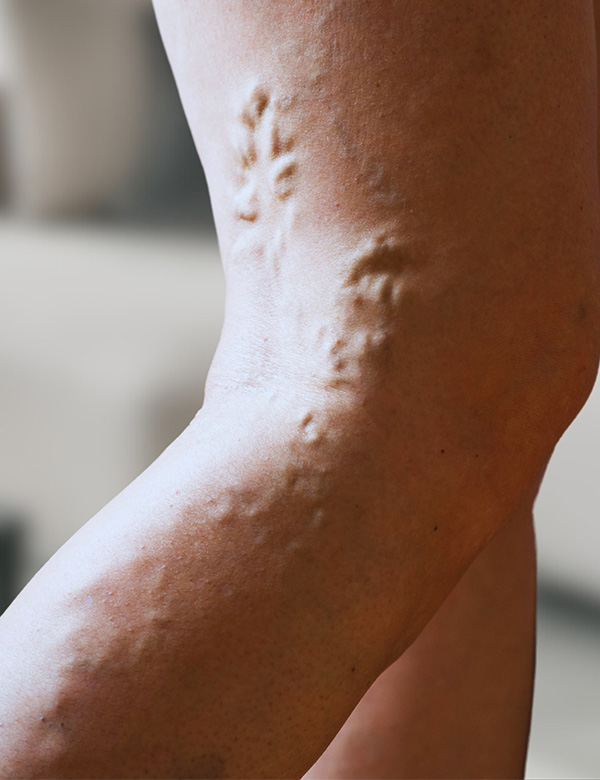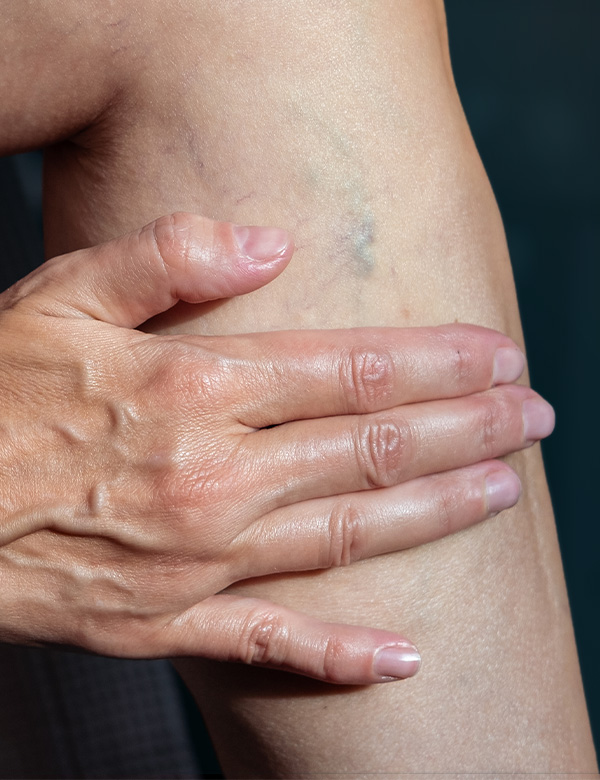Cholesterol assessment
Cholesterol Assessment – Consultation for Blood Lipids at Derma Medical Clinic in Zurich – Sihlcity
Cholesterol Assessment
Chronische Abszesse und schmerzhafte Knoten durch erfahrenen Hautarzt abklären und behandeln in der Derma Medical Clinic in Zürich - Sihlcity
Abnormal cholesterol levels, family history, or difficult-to-manage blood lipids:
In our cholesterol consultation, we check your levels and vascular health, determine possible causes, and discuss which treatment options are appropriate for your situation.
Examinations
Blood test
Vascular screening
Vascular ultrasound
Procedure
Initial consultation
Examination
Duration
approx. 30 minutes
Elevated Cholesterol at a Glance
When should cholesterol be lowered?
Cholesterol and other blood lipids play a central role in the development of vascular calcifications (arteriosclerosis).
Such changes affect not only the heart but the entire vascular system, from the carotid arteries to the leg arteries.
Because these vessels are not noticeable in everyday life, deposits often develop unnoticed for a long time.
In vascular medicine, vascular screening, ultrasound, and risk diagnostics can detect early whether vessels are already damaged.
- had abnormal cholesterol levels in a blood test (LDL, HDL, triglycerides)
- have a family history (heart attack, stroke, arteriosclerosis)
- are young and very high cholesterol levels have been detected (Familial Hypercholesterolemia)
- already have a vascular disease, e.g., intermittent claudication or vascular calcifications, vascular dilations
- despite medication, levels cannot be sufficiently lowered
- have additional risk factors such as high blood pressure, diabetes, obesity, or smoking

When should cholesterol be lowered?
Cholesterol and other blood lipids play a central role in the development of vascular calcifications (arteriosclerosis).
Such changes affect not only the heart but the entire vascular system, from the carotid arteries to the leg arteries.
Because these vessels are not noticeable in everyday life, deposits often develop unnoticed for a long time.
In vascular medicine, vascular screening, ultrasound, and risk diagnostics can detect early whether vessels are already damaged.
An examination is recommended if you…
- had abnormal cholesterol levels in a blood test (LDL, HDL, triglycerides)
- have a family history (heart attack, stroke, arteriosclerosis)
- are young and very high cholesterol levels have been detected (Familial Hypercholesterolemia)
- already have a vascular disease, e.g., intermittent claudication or vascular calcifications, vascular dilations
- despite medication, levels cannot be sufficiently lowered
- have additional risk factors such as high blood pressure, diabetes, obesity, or smoking
Treatment
In most cases, patients are referred by their family doctor if blood levels are abnormal and a vascular check-up is recommended.
We begin with a discussion about your levels, risk factors, and family history.
At Derma Medical Clinic, our vascular specialist uses a unique screening method: Blood circulation is measured completely painlessly in just a few minutes using cuffs and small sensors on the arms, legs, and toes.
Vascular problems such as calcifications or circulatory disorders often appear there first, even before symptoms occur. This allows even early changes to be reliably detected – a diagnostic standard otherwise only offered in specialized vascular centers.
Afterward, blood circulation is checked with vascular ultrasound (color duplex, Doppler). This allows us to see in real-time whether vessels are freely permeable, narrowed, or occluded.
Subsequently, a targeted blood test is performed.
We explain whether you have a lipid metabolism disorder and what your risk of vascular diseases is.
Based on this, we discuss which treatment options are appropriate for your situation: from lifestyle recommendations to medications.
How does the assessment of elevated cholesterol proceed?
Initial consultation
In most cases, patients come to us after a referral from their family doctor. We discuss your findings, risk factors, and family history.
Blood and ultrasoundexamination
We check your cholesterol levels. Additionally, we examine the vessels using vascular screening and ultrasound.
Evaluation & Therapy
Together, we discuss which measures are appropriate for your situation: from lifestyle recommendations to medications.

At Derma Medical Clinic, the assessment and treatment of vascular diseases are carried out by
Dr. Andreas Gutwein
, a specialist in Angiology and General Internal Medicine, FA Phlebology
He is a specialist in vascular diseases and has many years of experience in the diagnosis and treatment of lipid metabolism disorders.

Dr. med. Andreas Gutwein
Specialist in Angiology and General Internal Medicine FMH
Expert in Vascular Medicine & Men’s Health

Dr. med. Benjamin Miller
Board-certified Specialist in Dermatology & Venereology FMH
What you can expect from us
Angiology: Vascular medicine
At Derma Medical Clinic, your cholesterol is not viewed in isolation but in the context of your entire vascular system. This way, we not only detect abnormal blood levels but also whether pathological vascular narrowing/widening or calcifications are already present.
Vascular ultrasound: precise diagnostics
We combine precise blood analyses with state-of-the-art vascular screening and the latest vascular ultrasound. This allows us to assess your personal risk of heart attack or stroke significantly better than would be possible with laboratory values alone.
Vascular medicine meets dermatology
Many vascular diseases first become noticeable on the skin – through swelling, discoloration, or visible veins. In the Derma Medical Clinic, vascular medicine and dermatology therefore complement each other perfectly.
Everything under one roof
You receive diagnosis, medical treatment, and cosmetic support in one place. This means you have fixed contact persons, short distances, and coordinated care, from the initial examination to aftercare.
Abnormal cholesterol levels or family history?
Have your elevated blood lipids assessed – and check whether vascular changes are already present.
FAQ – Frequently Asked Questions about Elevated Cholesterol
At what level is cholesterol too high?
As a rough guide: LDL cholesterol should ideally be below 3.0 mmol/L, and significantly lower for high-risk patients (intermittent claudication <1.4 mmol/L). The exact target value depends on pre-existing conditions and risk factors.
Which doctor is responsible for high cholesterol – family doctor or internist?
The initial blood levels are usually taken by the family doctor. For a specialized assessment and therapy, angiologists are the right contact persons.
What is examined in a cholesterol consultation?
In addition to a detailed discussion, blood levels are checked, and vascular screening and vascular ultrasound are performed.
Why is an additional screening performed at Derma Medical Clinic?
We use the AngE™ ABI+ Screening because it measures blood flow in the arms, legs, and toes precisely and painlessly within a few minutes. Vascular problems such as calcifications or circulatory disorders often show up there first, even before symptoms arise. This gives you a particularly reliable examination – a diagnostic standard that is otherwise only offered in specialized vascular centers.
What do LDL, HDL, and triglycerides mean?
LDL (“bad cholesterol”) promotes vascular deposits, HDL (“good cholesterol”) protects the vessels. Triglycerides are blood lipids that are also harmful in excessive amounts.
How do I recognize a familial lipid metabolism disorder?
If very high cholesterol levels occur at a young age or if there are many heart attacks or strokes in the family, a familial cause should be considered.
Is a healthy diet sufficient to lower cholesterol?
For slight elevations, a change in diet can help. If levels are very high or additional risk factors are present, medication is often necessary.
What medications are available for high cholesterol?
Statins are most commonly used. If these are not sufficient or not tolerated, other agents or newer injectable preparations are available, which may only be prescribed by a specialist.
What to do if statins are not tolerated?
In such cases, alternative medications or modern injection therapies can be used. Your doctor will decide individually on the best therapy.
How often should cholesterol levels be checked?
For normal and stable levels, a check-up every one to two years is usually sufficient. If an elevation or risk is already present, the levels should be checked more frequently.



